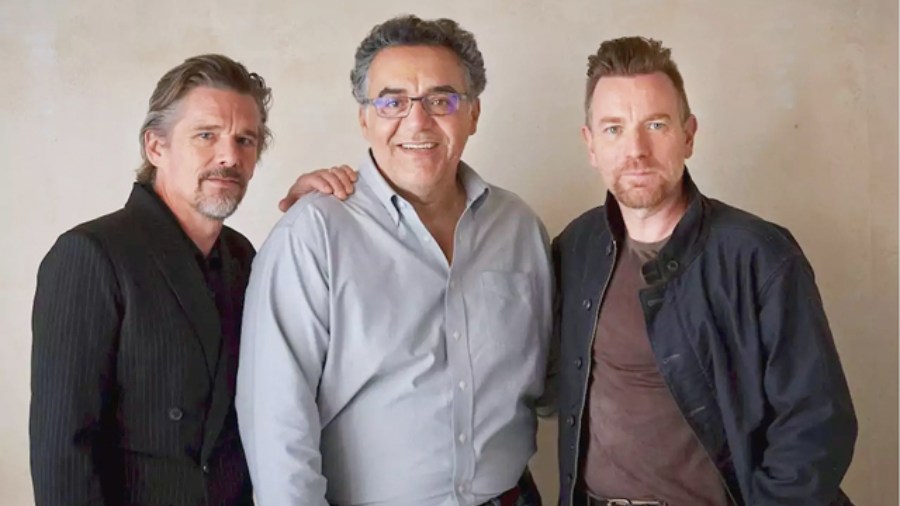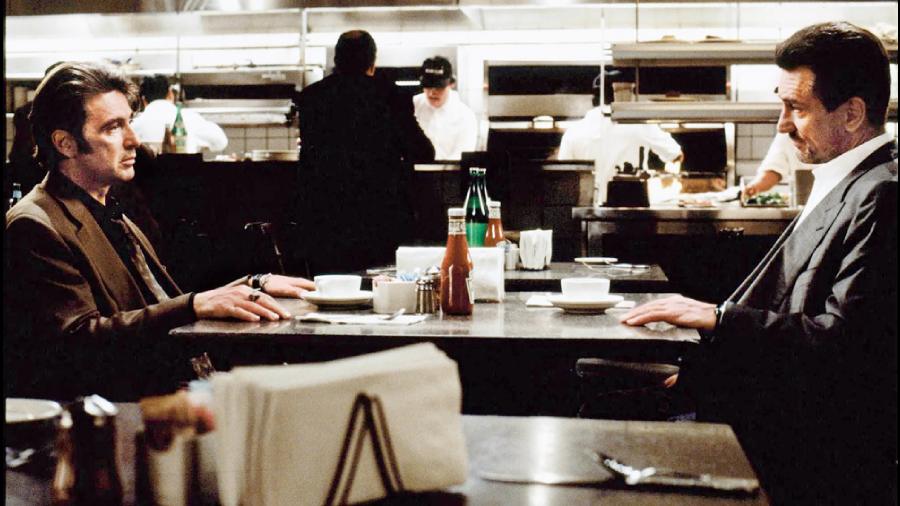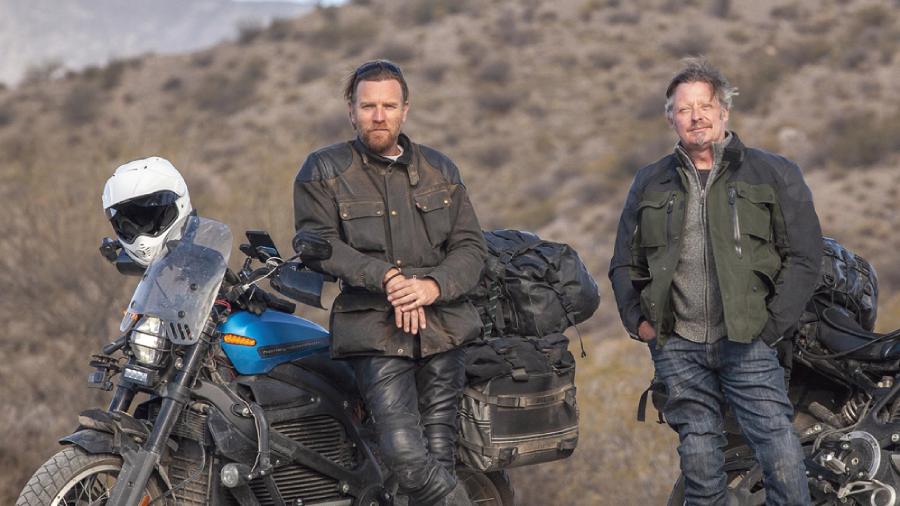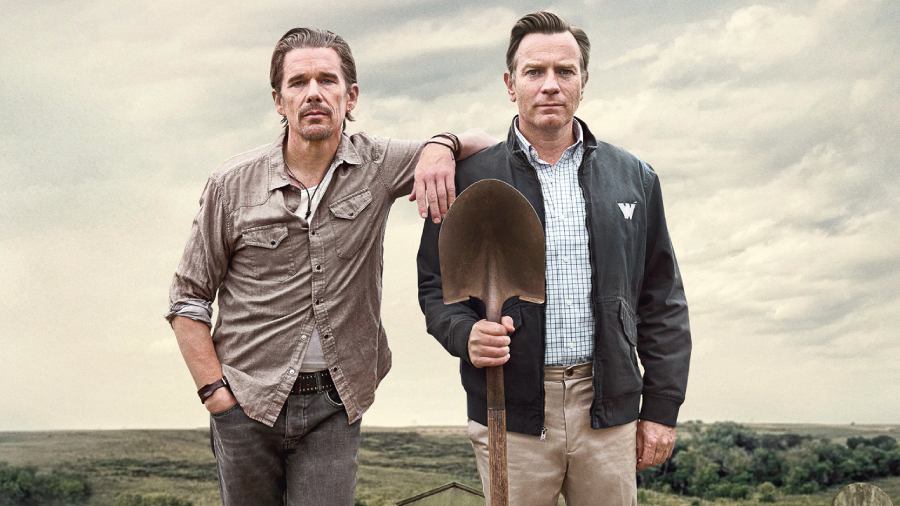Asking a group of friends their oldest grudge often elicits intimate details, especially when it comes to shocking stories about father-son relationships that go sour, to the point that neither of them reach out for years until it’s too late. But some parental emotional abuses inflicted on a child are unpardonable. That’s what happens in the film (streaming on Apple TV+) Raymond & Ray, starring Ewan McGregor as Raymond and Ethan Hawke as Ray while, directed by Rodrigo García.
Having moved away from the father a long time ago, the two brothers are aware that the only thing that had changed in all the years is the mortal status of their father. The half-brothers find it difficult to grieve for someone they just couldn’t understand or justify the things he did. Yet, a funeral is at hand and they have to navigate odd family dynamics. The two go on a road trip to be at the cemetery and during the journey, they meet the partners their father had in his life and discover what he had been up to since they left. But at the back of their mind is the thought of how manipulative their father was, to the point the two were basically given the same name. And he wasn’t done after death because his final wish was that the half-brothers actually dig his grave. Should they hold on to their grudge? The Telegraph logged in to a video call and here’s what we heard from Ewan McGregor and Ethan Hawke.

Ewan McGregor and Ethan Hawke with the film’s director Rodrigo García
It seems that the central journey to bury the father unveils a sense of relief for the brothers’ cathartic experience. Do you agree with this notion and can you elaborate on the theme of forgiveness in the film… the two sons wanting to forgive the father for the tremendous pain caused to the boys.
Ethan Hawke: I do think the movie, in a way, is a meditation on forgiveness and the possibility of it and the impossibility of it.
Both the sons are tripping on their own anger. In a lot of ways we’re all taught the wrong ways for anger to manifest, you’re not supposed to repress it... you’re not even supposed to release it. So what are you supposed to do with it? It is a very difficult question to answer. Because if you let it sit inside, it’s toxic. And if you let it spill out, it’s toxic to others. And the movie wrestles with this dynamic… there’s real trauma for these men. And is death going to heal it? Is it even possible?
It’s kind of shocking that this man has hurt these two sons so much and so many wonderful relationships, and the other aspects of his life that are so confusing to the sons. What I love about the movie is that it really doesn’t present you with an answer to these questions, which I really think is what good art is really supposed to do: Give you the the right questions to ask, the questions that you can carry with you as a member in the audience. And that’s what I think Rodrigo (Garcia, the director) does so well up until the end. The last line where I say we never really knew him… I say let’s talk about it later. So it’s an ongoing thing. There are things you haven’t done with your parents when they are there. And then they are gone. When you’re away on a trip, they’re there with us. What I love about the movie is it doesn’t have any pithy cute answers to these questions. I love the priest’s final prayer, which is kind of a letting go of things.
You both are fathers in real life. Did the film change your perception of fatherhood?
Ewan McGregor: No. I don’t think so. It’s an exploration of two brothers who have had horrible experiences in childhood and are damaged by their father’s behaviour in two different ways. So, of course, if you’re exploring that, you’re exploring that through the eyes of Rodrigo Garcia, who is obviously exploring it in his writing. But it’s not as simple as having sort of a lightning bolt moment in your own life where you’re just exploring different parts of the world with your work and things like that.
Ethan: When you are talking about the terrain of a family — whether we’re talking about mothers or fathers and daughters and sons — it’s like the terrain of human psychology about how we’re built and how we’re made up. I don’t think it’s possible to have one ah-ha moment and figure it all out. As actors as well as audience members, it’s a part of our own psychology too — where we came from, where we’re going, what kind of parent am I, when a kid is born this person is relying on you completely; they’re helpless while you’re building their psyche… you can go about the task with love or you can really create a trap for them.
How did you prepare yourself up to the explosive point that unfolds in the cemetery?
Ewan: I think that’s the journey for each of us with these beautifully drawn characters, and Rodrigo’s script is a journey towards that moment. And then the unusualness of his script is that there’s more to the story afterwards. But building up to that moment is sort of what working on this character was all about… the conversations that we have had, Ray constantly trying to get Raymond to accept his anger… to stop hiding from it and allowing it to let it out. At that moment, where he’s trying so hard to bury his father properly and correctly and the way he thinks it should be done, but he can’t; all he’s got left is to let that rage out. And that was sort of what my job was — building Raymond up to allow him to express that anger finally. We’ve been talking this morning a little bit about forgiveness. And I don’t see Raymond forgiving his father or anything. It’s just that he’s learning to accept the experience of his childhood as opposed to forgive his father for it. And that’s what we have to do, I suppose in life it is about learning how do we live with it, as opposed to how do we change the past.
Ethan: But it’s a beautiful moment, because you feel that the anger is coming on and being released. The rage is going inward as well as outward. It’s really confusing… like it’s a cup of boiling water was spilling over and it’s burning itself and it’s burning other people. And I think that was kind of a grace moment in the movie. We’re brothers and they’re connected. I think what you just said about forgiveness is incredibly beautiful; I think there is this idea of forgiveness — you just say you forgive somebody and then it’s all over. But there is no forgiveness without acceptance.

Al Pacino and Robert De Niro in Heat
It’s rare to see actors with similar career arches working together. There is a Robert De Niro-Al Pacino kind of thing. You two have the same consistency and have never been typecast. Is it a challenge to work with somebody from the same tribe?
Ethan: It is surprising how often culture and society pit people against each other. I know exactly what you mean, when you think if we were in a movie together, we’d have to be enemies or something, like the way Pacino and De Niro were… because they’re of a similar type, they must not like each other. So I think for us to be cast as brothers is great. We’ve been watching each other for 25 years, admiring the way the other one is navigating the craft. To get a chance to have each of us an amazing role to play is an unbelievable opportunity. We are smart enough to be grateful for it.
In the movie the two of you take a road trip. Ewan, do you have a road trip in mind with Charley (Boorman)? (Ewan and Charley have been friends for long and they have taken cross-country motorcycle rides, which have been turned into TV series.)
Ewan: Yes, Charley and I’ll for sure do another long round trip at some point. We’ve got a couple of ideas. But we’re not ready. We’re not ready to like firmly state we’ve got two trip ideas. And maybe we can string them out and do them both before we’re too old for such things. But we’ve got some ideas. I also have a solo trip idea to do, as I’m newly an American citizen (became an American citizen in 2016), and I want to travel across America, and do a trip… a solo trip on an old bike, and I’ll raise the old American chopper and go through maybe the southern states, coast to coast. So that’s something I’m working on trying to put together at the moment just to explore America… as somebody who’s an American, but not born in America. So I think it might be an interesting perspective. Just what is life like in America at the moment? It’s such an interesting period of time.

Ewan McGregor and Charley Boorman
How do you guys choose your roles because it seems that both of you are very careful about what you play on screen?
Ewan: I have no philosophy about it. I would love to have sort of like a checklist of things I’m looking for. But it’s totally instinct. It’s really just the love of being enrapt with an amazing story. That’s all I look for. And getting to be part of that storytelling is great. When you become a director, a writer… I’ve directed one movie (American Pastoral)… the same things apply. It’s just the need to be part of telling a great story and the joy of getting to play the words on a page, there’s something about reading this script. Rodrigo has done an amazing job.
Ethan: I think if you’re going to have a long career, you have to stay connected to joy. Like if you just use the word ‘joy’ three times… we talked about it. You have to stay connected to it. It’s really easy to get lost and get jaded and get cynical. But if you stay connected to what brings joy, everything gets sorted out. I love this director, I love this co-star, I love this material. It’s got one or more of those things that generate enough joy to make you really look forward to getting up at 4.30am and driving two hours to get a shot. The more you work, the more easy it is to get cynical. But if you stay connected to that joy, then it starts giving back to you. The experience of making this movie wasn’t tiring. It kind of refilled my texts. It was so much fun to make a movie and to be on set in this way. It felt so simple. If you smell it, it’s either right for you or it’s not.











